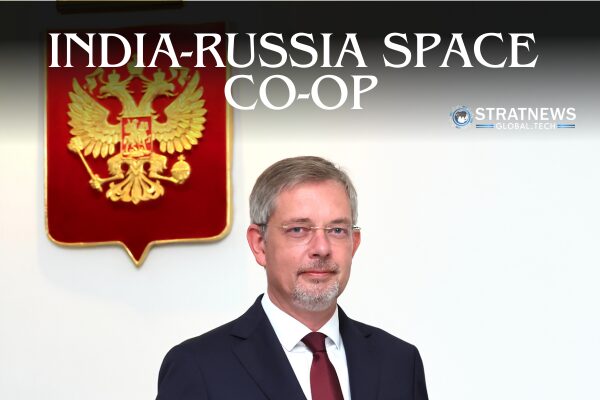As India celebrates the successful return of Axiom‑4, which carried Group Captain Shubhanshu Shukla to the International Space Station, Russia has reaffirmed its long-standing partnership with India in space exploration.
On the eve of the mission’s splashdown, Russian Ambassador to India Denis Alipov called the collaboration “transformational,” highlighting decades of trust, technology sharing, and joint ambition—from launching India’s first satellite in 1975 to training its astronauts today.
A Legacy of Collaboration: Aryabhata to Axiom‑4
In an exclusive conversation with StratNewsGlobal, Ambassador Alipov traced the partnership to the 1975 Aryabhata satellite, launched free by the USSR, and highlighted the historic voyage of Wing Commander Rakesh Sharma aboard Soyuz T‑11 in 1984. These symbolized Soviet trust in India and anchored decades of strategic cooperation.
Fast-forwarding to today, he said: “India has made remarkable progress in advancing its national space program…The success of Chandrayaan‑3, the recent flight of an Indian astronaut to the ISS, Gaganyaan, Chandrayaan‑4, the Venus Orbiter Mission, and the indigenous modular space station Bharatiya Antariksh are notable milestones.”
Astronaut Training & Gaganyaan Support
Since 2019, Roscosmos and ISRO have been deeply engaged in the Gaganyaan program. Four Indian astronauts—including Shukla—trained at Star City, mastering survival, zero‑G, biomedical protocols, spacecraft systems, crew escape, and flight suit use.
Ambassador Alipov confirmed, “Currently, Roscosmos and ISRO are actively collaborating on the Gaganyaan mission. This includes astronaut training, support in the development of the crewed spacecraft, provision of life‑support and crew‑escape systems, flight suits, and capacity building in space medicine.”
Technical Collaboration: Propulsion, Navigation & Secrecy
Beyond human spaceflight, Alipov described cooperation in sophisticated technical fields, “Space propulsion engineering Satellite navigation systems (GLONASS and India’s NavIC) Ground station infrastructure. And “areas we prefer not to disclose publicly”—likely involving dual-use or advanced technologies.”
He also mentioned expanding cooperation with private-sector space firms and pinpointed an ambitious project, “One promising frontier may be the collaboration in development of nuclear power sources for deep space exploration.”
Multilateral Diplomacy: PAROS, COPUOS & BRICS
India and Russia align closely at global platforms like the UN COPUOS, advocating for the prevention of an arms race in outer space, and at BRICS.
A BRICS Heads of Space Agencies meeting in April set shared goals: data sharing, training, joint missions. Brazil is drafting a White Paper on Sustainable Space Connectivity, supported by Russia and India; A Virtual Constellation of Remote Sensing Satellites in progress; A BRICS Space Council proposed by Russia under active discussion; and A joint satellite mission on climate monitoring is planned for COP30 backing.
Ambassador Alipov said, “Space is increasingly becoming a strategic pillar of BRICS cooperation…We also support the proposal for a joint newsletter to facilitate information exchange and promote capacity‑building initiatives.”
Looking Ahead: Deep Space Missions & Strategic Trust
Echoing the ambassador, “Our dynamic partnership … may extend to nuclear power sources for deep space exploration… From Aryabhata in 1975 to Axiom‑4 in 2025, the India–Russia space relationship is not transactional, but transformational.”
He stressed that Russian support remains pivotal as India advances toward its Bharatiya Antariksh Station, Gaganyaan in 2027, and interplanetary missions like Chandrayaan‑4 and the Venus probe.
Shukla’s successful career, from Star City training to SPLS ISS return, reinforces this enduring trajectory.
A Strategic, Evolving Foreign Policy Asset
Politics aside, Ambassador Alipov’s insights affirm that the India–Russia space relationship now integrates: Historic partnership—trusted Soviet-era launches; Current training & life-support systems; High-tech satellite, propulsion, and navigation cooperation; Emerging private-sector and nuclear propulsion avenues; Global space diplomacy—BRICS, UN, climate, arms race prevention; Modern missions—Axiom‑4; Gaganyaan, Bharatiya Antariksh, and Chandrayaan missions
As PM Modi plans to visit China in September for the SCO summit, this strengthened Indo-Russia space alliance underscores India’s strategic autonomy, technological depth, and rising reputation as a global space power—backed, in part, by Russian experience and collaboration.


